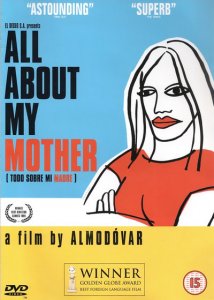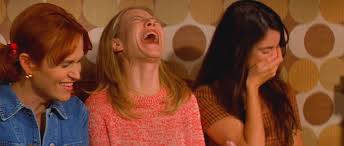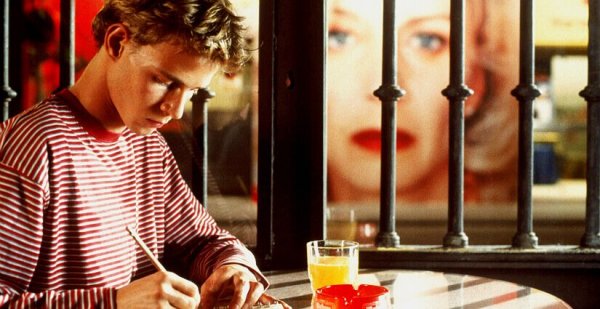All About My Mother: Forgotten Groups


Written and verified by the film critic Leah Padalino
There’s a lot of talk about higher visibility for women these days. Now more and more people are talking about trans visibility, the multicultural societies we live in, and a world where concepts of race and gender start to blur and labels disappear entirely. This new reality is also starting to show up more on the big screen, but one Spanish director has been pioneering these themes for a long time. This director is Pedro Almodóvar, and one of the best examples of this idea is his movie, All About My Mother.
Almodóvar works with stories that could easily turn into parodies but, instead, he manages to move us and touch our hearts. Through his movies, he’s brought us characters who are completely marginalized and in the major roles. He’s fascinated by naturalism, with capturing reality just the way it is, in the most objective way possible. This movie came from that fascination and a desire to fight for higher visibility for women.
Some background on Almodóvar and All About My Mother
Almodóvar mixes the traditional with the revolutionary. If you look at the way his work has evolved, you’ll notice that he’s been refining his style and his movies have become even more colorful. Punk, anti-church, marginalized characters, women, pop culture, La Movida Madrileña, lying, and black humor are just a few of the signature elements of this renowned Spanish director. All About My Mother blends comic and dramatic aspects, but it’s always in an effort to be natural. The secret to that? Colloquial, intimate language that’s as close as possible to the way we really speak.
Unlike a lot of movies, in All About My Mother, the drama isn’t the ultimate goal. It’s not the end result. Instead, it’s the beginning, the starting point for the plot. As sad as the plot is, it’s a reminder that life goes on for all of us. Life is a constant struggle, and you never know what you’ll encounter next.
All About My Mother is an homage to A Streetcar Named Desire and All About Eve. Almodóvar dives deeply into these influences and makes them a big part of the movie itself. The entire plot of All About My Mother is linked to the play A Streetcar Named Desire by Tennessee Williams. It sits alongside, molds itself to, and also mixes with the original American play.
The movie deconstructs the concepts of gender and womanhood. It shows you a different, but no so distant reality: colorful, intimate, bittersweet, and direct. All About My Mother has become a true classic of Spanish cinema, and it also won the Oscar for best foreign film in 1999.
“You are more authentic the more you resemble what you’ve dreamed of being.“
-All About My Mother-

The female characters in All About My Mother
There’s no doubt that the main characters in All About My Mother are women. There are hardly any male characters and, just like a lot of Almodóvar’s movies, father figures are nonexistent or shadowy. This movie is focused on mothers and women, no matter where they come from and no matter what their life is like. Almodóvar captures the different lives of women from this time period really well. The characters are all well-fleshed out and, although they’re like caricatures, they also fulfill their role and show you a kind of diversity that’s becoming more and more normal.
Manuela, Huma, Agrado, and Sister Rosa are the main four women in the story. They’re all very different, they all have really powerful lines, and they have extremely different, unique personalities, but they’re all women. Manuela is the driving force behind the story. She emigrated from Argentina to Spain and spent her first years there in Barcelona with a man who ended up changing sexes and became Lola. Her son, Esteban, was the fruit of their relationship.
Looking at the characters in detail
Manuela fled to Madrid without telling Lola about Esteban and began a new life there as a nurse. On Esteban’s birthday, they go see the play, A Streetcar Named Desire, which she feels very connected to. When Esteban tries to get an autograph from the main actress, Huma Rojo, a car runs over her son and dies. From that moment on, Manuela’s life becomes linked to Huma’s and she goes on a journey into her past, to Barcelona.

Manuela is a symbol for mothers in general and the unconditional love they feel for their children. Her character gives us a wonderful story of overcoming hardships. Huma, on the other hand, seems like a cold, distant woman at the beginning. It looks like fame has gotten to her head, but she actually develops a good friendship with Manuela, and what we see from then on is a sensitive woman who’s suffering and just wants to feel loved. We also see that Huma is in a relationship with her castmate, Nina, a young drug addict who goes through a lot of ups and downs.
When she gets to Barcelona, Manuela meets up with an old friend, Agrado. She’s an authentic woman, although she’s “made of silicone”. Can someone be authentic if their body is completely artificial? Agrado is a symbol for the idea that authenticity is about more than the physical side of things. She’s the woman she’s always dreamed of being. She’s a transsexual woman who’s made her own way in life, and is one of the most interesting characters in the movie. She works as a prostitute, but as the story progresses we witness an incredible evolution in her character. At one point, she gives one of the most memorable monologues in All About My Mother.
Breaking taboos
All About My Mother breaks endless taboos: HIV, transsexuality, homosexuality, gender barriers, female empowerment, prostitution, immigration, etc… To be more specific, it’s a movie that gives us an intimate view of people who are part of “marginalized groups”, the forgotten.
It shows us the other side of the coin, telling us a story that might seem atypical. However, this movie tells it in such an intimate way that you can do nothing but empathize with all the women in the movie. One of the most delicate of all these themes is HIV. As far as we can tell, it’s still a topic that makes people panic nowadays. Most people seem to think that if you have HIV, you’re also a drug addict or prostitute.
So how does All About My Mother deal with this theme? The character with this disease is a woman, and not just any woman, a nun. She’s a young Spanish woman from a good family who has dedicated her life to others. What this shows you is that anyone can end up getting it. It doesn’t matter what your background is, it can’t protect you from fate.
All About My Mother has a totally inclusive story. All these women represent one aspect of society and one way of dealing with life. In the end, they all deserve our respect.
“I have always depended on the kindness of strangers.”
-All About My Mother-
This text is provided for informational purposes only and does not replace consultation with a professional. If in doubt, consult your specialist.








